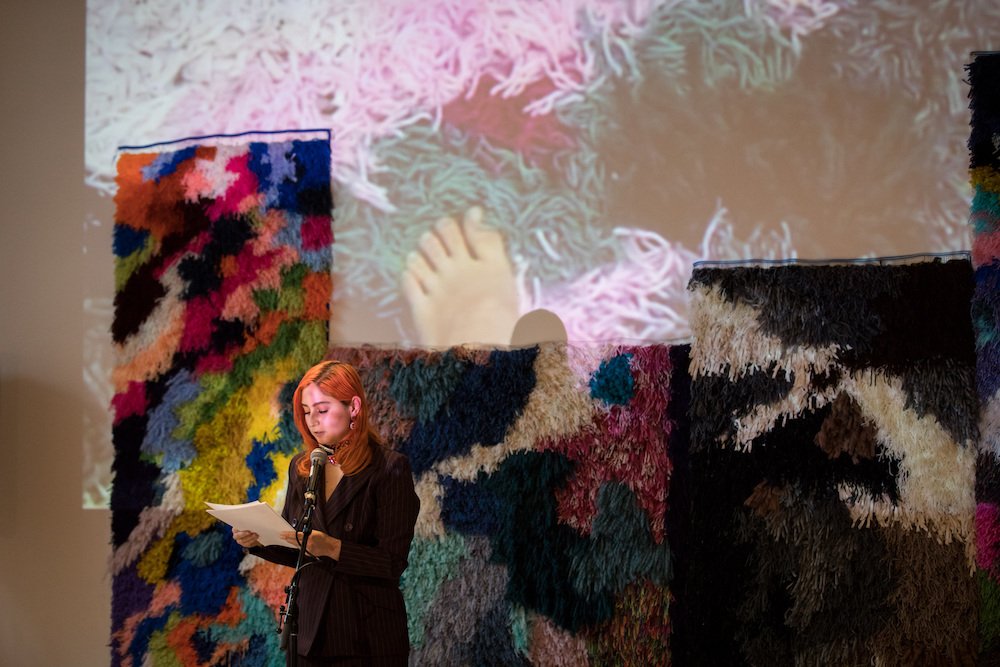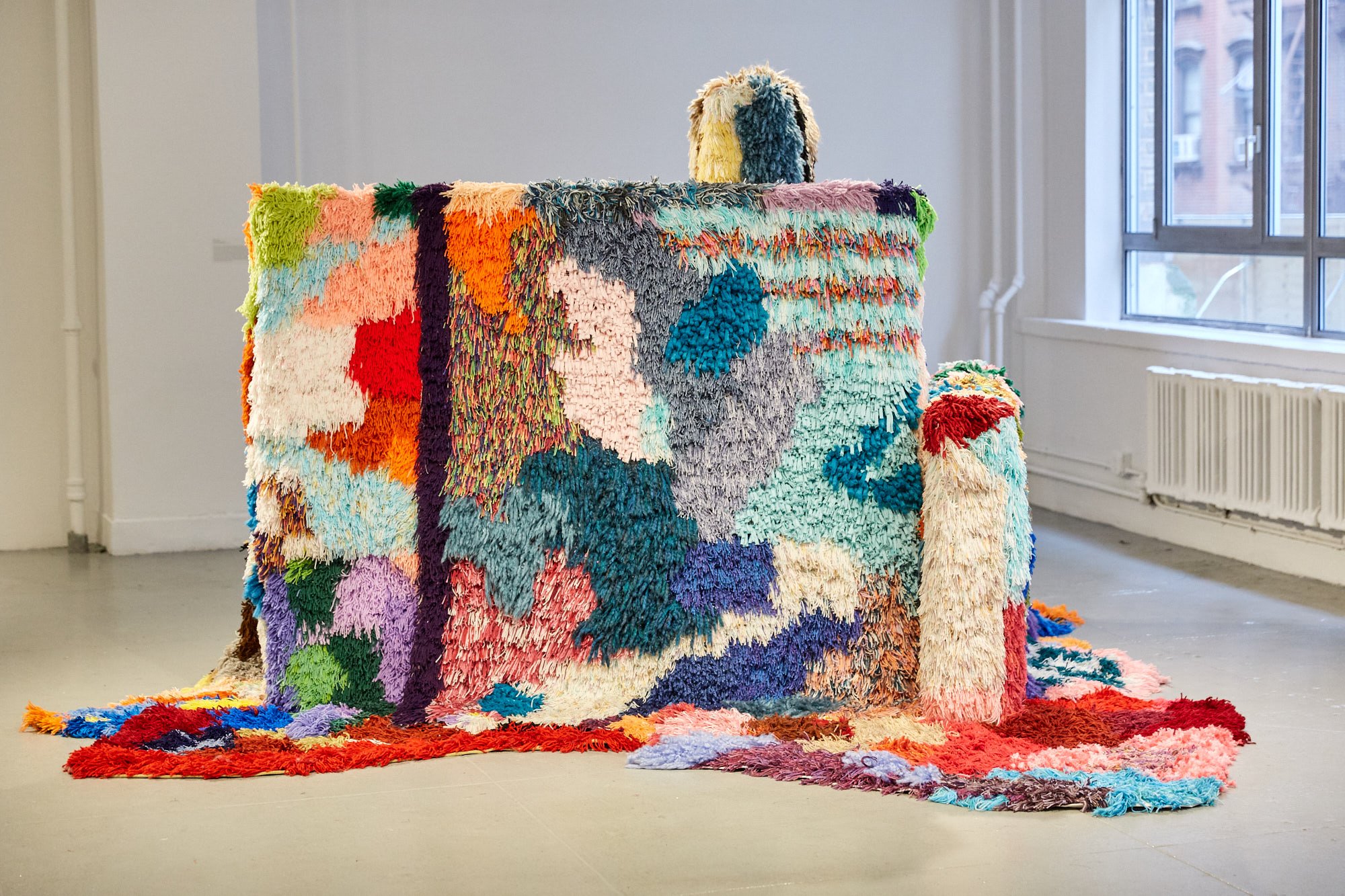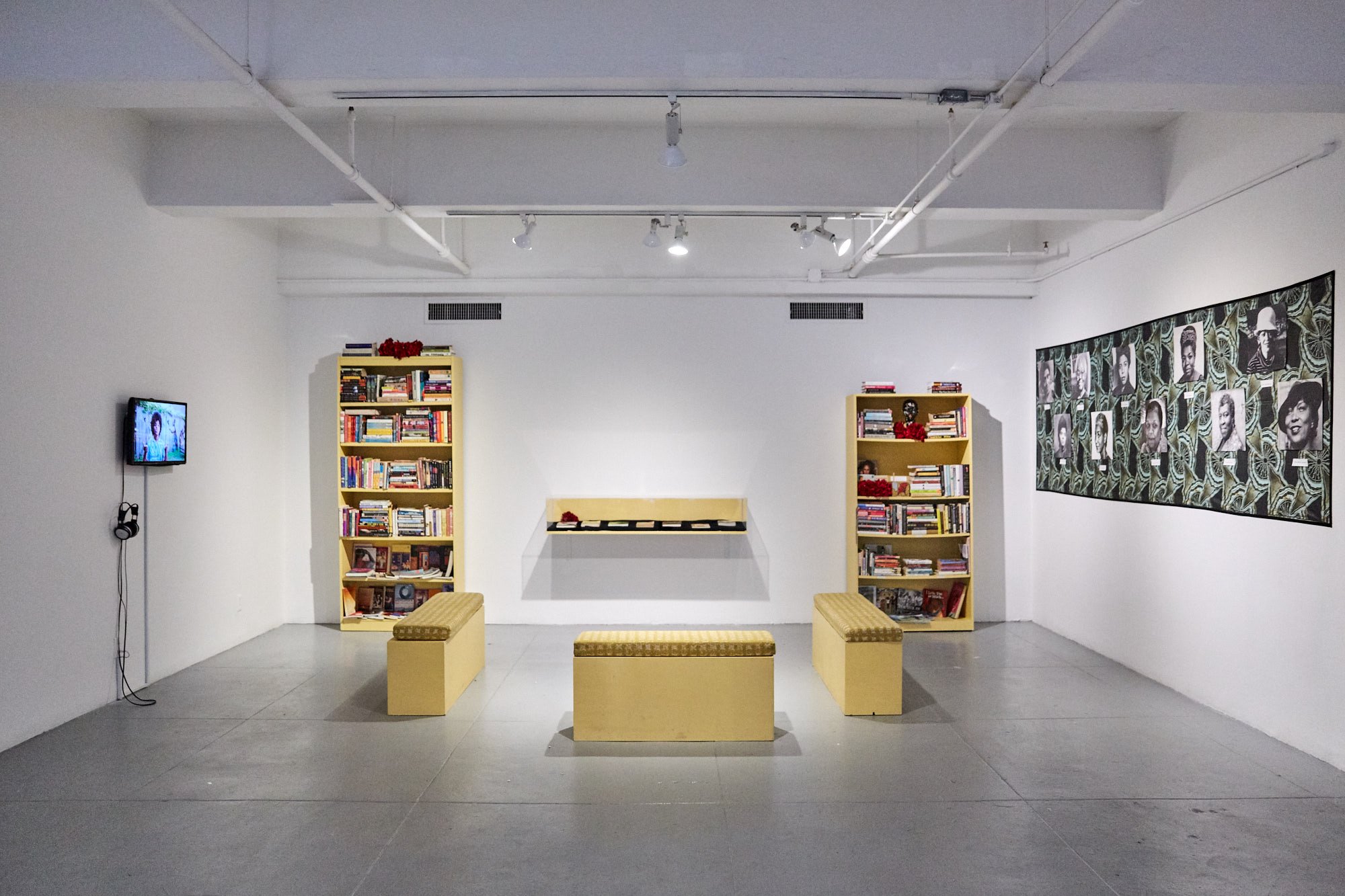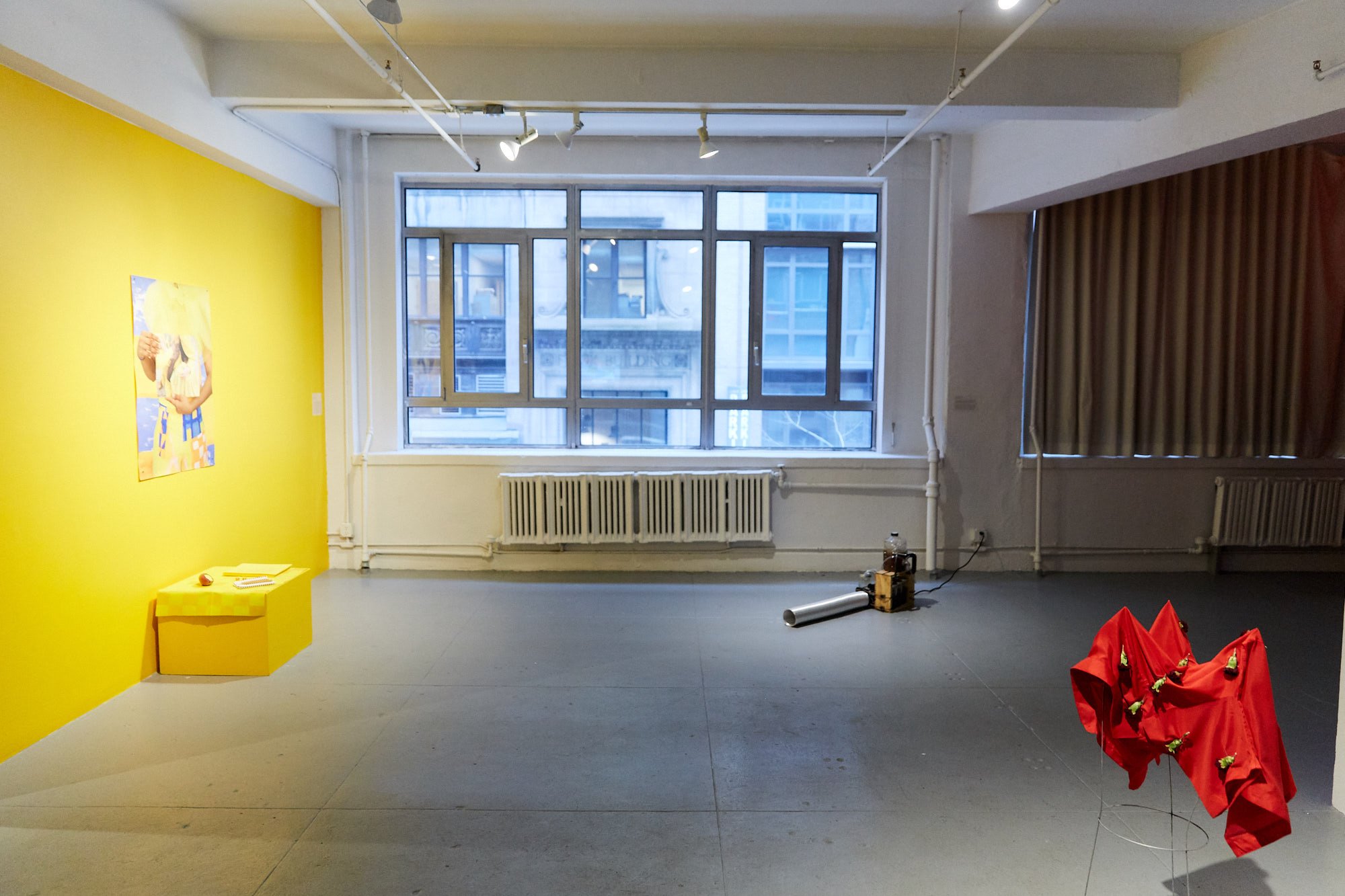CURRICULUM: spaces of learning and unlearning
January 16 – March 16, 2019
Curated by Stamatina Gregory & Jeanne Vaccaro
OlaRonke Akinmowo for Free Black Women’s Library
Becca Albee
Amelia Bande
Lukaza Branfman-Verissimo
Christen Clifford
January Hunt
Carolyn Lazard
Candice Lin & Patrick Staff
Julie Tolentino
Quay Quinn Wolf
Sarah Zapata
EFA Project Space presents CURRICULUM: spaces of learning and unlearning, an exhibition that reimagines collective study outside of cultural institutions and creates pathways for resistance by asking the questions: What would a curriculum for collective study and political action look and feel like? Can simply being present together be a form of decades past? What can we do that we have not yet done?
The second-wave feminist ethos of “the personal is political”—coined to underscore the interconnectedness of individual experience and larger social and political structures—has been, in our contemporary moment, inverted. Popular feminism, as it manifests today—in the news cycle, on social media, in consumer culture—enjoys an almost unprecedented visibility, as it operates through a framework of personal strength and the individual capacity to overcome (and collapses into a capitalist aestheticization of wellness and self-care). The political is now personal. Feminism’s narratives are constrained and enclosed by contemporary economies of information and reception: movements toward social justice have had their vision replaced by the politics of visibility, trapped in an economy of shares, clicks, and likes. How can self-care move from a restoration of one’s individual capacity to a collective, collaborative project?
CURRICULUM explores the potential for collective study outside of formal classrooms and university spaces—a study which might move past prevailing modes of circulation. Emerging from a space of reading and revision, these works utilize a range of artistic strategies for intuitive, participatory, haptic learning—from sonic enclosures to ceramic vessels and woolen landscapes to photographic portraits. Together, these works position self-care as an ethical and artistic practice of political action, moving towards ways of reconceiving the interaction of bodies and ideas in the present.
Several artists in the exhibition, including Christen Clifford and January Hunt, create visual, sonic, and material enclosures, refiguring bodily relations in regard to community and healing. Clifford’s Interiors (2018) immerses the viewer in a visual field made from the footage of diagnostic cameras as they explore the bodily interior of several subjects across genders. Becca Albee’s revisitation of a 1992 text on radical feminist therapy and collective organizing explores our personal attachments to formative texts, while proposing that such sustained engagement is necessary for self and community transformation.
Candice Lin and Patrick Staff’s Hormonal Fog (2016-18) and Carolyn Lazard’s Crip Time (2017) radically reconceptualize bodily differences and their relationship to both structures of power and notions of private and public space. By acknowledging the most basic, material space of our shared existence—the air we breathe—Lin and Staff’s infiltration of the gallery space through the vaporized release of botanically-derived anti-androgenic compounds addresses both alternative forms of therapeutic transformation and new forms of environmental solidarity. In Lazard’s video, an unidentifiable protagonist performs one of the repetitive tasks of managing chronic illness, moving the private and mundane into the realm of widely shared experience.
The work of Lukaza Branfman-Verissimo, Quay Quinn Wolf, and Sarah Zapata propose new forms of intimacy through sculpture and image. Branfman-Verissimo’s painting translates the metaphorical act of holding space for individual and collective learning into deeply affective imagery, while Wolf’s sculptures invoke the demands of care through both prosaic and perishable materials. Zapata’s woolen landscapes propose a new kind of monumentality for our present moment: one that engages multiple senses and is indebted to indigenous histories.
An area of the exhibition will be dedicated to OlaRonke Akinmowo’s ongoing project The Free Black Women’s Library, a mobile space committed to circulating the work of Black women authors. Conceived as part of the tradition of mobile libraries as spaces for collective learning, community building, and anti-capitalist sites of exchange, the space will host workshops and open hours throughout the exhibition.
In co-creating forms of collective study for our present moment, CURRICULUM seeks to construct an environment for both contemplation and movement.Taken together, these works ask: what can a personal, spatial practice enable? What histories can be contained, reconstructed, and remade? What traumas can be held and learned from?
CURRICULUM builds on the foundation of a corollary exhibition, READING ROOM (June 6-30, 2018 at Root Division, San Francisco), which considered themes of the revision and reconstruction of feminist texts and canonical figures. Following the work of historical recovery and image remediation that occurred in READING ROOM, CURRICULUM explores the present as a site of renewed potential.
The exhibition will be activated through a number of performances and programs. The opening on the evening of Wednesday, January 16 features a durational performance by Julie Tolentino and Pigpen (aka Stosh Fila), followed by an embodied practice led by Tolentino on Saturday, January 19. Scholar and critic Jennifer Doyle will join us on February 15 to read from Letting Go, which describes the experience of being stalked by a student, and offers an extended reflection on the psychic costs of living with harassment. A panel discussion on Saturday, March 2 considers collective strategies for reparative care, featuring writer and organizer Ted Kerr of What Would an HIV Doula Do?, filmmaker and scholar Lana Lin, and OlaRonke Akinmowo, creator of the Free Black Women’s Library. Akinmowo will host regular "book sessions" to discuss texts selected from the Free Black Women's Library over the course of the exhibition. A performance by Amelia Bande on Saturday, March 9 will function as a collective rehearsal, inviting a new relation between the audience and artworks.
EVENTS
Wednesday, January 16, 2019, 5-6 PM
Curatorial Walk-Through for Curriculum
Sunday, January 27, 2019, 2-5 PM
The Free Black Women's Library Book Sessions
Friday, February 15, 2019, 6-8 PM
Letting Go: A reading by scholar and critic Jennifer Doyle
Monday, February 25, 2019, 6:30-8 PM
ICI hosts CURRICULUM with Becca Albee, Macarena Gómez-Barris, Stamatina Gregory, Jeanne Vaccaro and Sarah Zapata
Saturday, March 2, 2019, 3-5 PM
Collective Strategies for Reparative Care: A Panel Discussion
Saturday, March 9, 2019, 4-6 PM
Is It Our Anger That Makes Us So Beautiful? a live performance by Amelia Bande
Sarah Zapata, To Teach or Assume Authority, 2018-2019. Natural and synthetic fiber, handwoven fabric, pine. Dimensions Variable. Courtesy of the artist.
RESOURCES
PRESS
ArtForum, “CURRICULUM: spaces of learning and unlearning”, Sophia Larigakis, Mar. 1, 2019
Hyperallergic, “Opening Up the White Cube”, Alexis Clements, Feb 18, 2019.
This exhibition is produced with support from Women & Performance: a journal of feminist theory and the NYU Center for Disability Studies. The exhibition's curatorial fellow is Java Jones.
Sarah Zapata, To Teach or Assume Authority, 2018. Natural and synthetic fiber, handwoven fabric, pine.144 x 144 x 84 in. (approximate). Image by Walter Wlodarczyk.
Sarah Zapata, To Teach or Assume Authority, 2018. Natural and synthetic fiber, handwoven fabric, pine.144 x 144 x 84 in. (approximate).
Julie Tolentino, Conversation Piece (from .bury.me.fiercely.), 2019. Performance & Performance Ephemera. Dimensions Variable.
Sarah Zapata, To Teach or Assume Authority (detail), 2018. Natural and synthetic fiber, handwoven fabric, pine.144 x 144 x 84 in. (approximate)
Julie Tolentino, Conversation Piece (from .bury.me.fiercely.), 2019. Performance & Performance Ephemera. Dimensions Variable.
OlaRonke Akinmowo for Free Black Women’s Library, Free Black Women’s Library, 2018 (on going). Installation with video. Dimension variable.
Left:
Lukaza Branfman-Verissimo, Storyteller 2, 2017. Photographed in collaboration with Azha Luckman. Digital and film inkjet print. Ed 1 of 1 + 1 AP. 30 x 40 in.
Lukaza Branfman-Verissimo, The Storyteller of the Future’s Altar, 2017. Painted canvas, fabric, homemade candles, sacred objects. 22 x 22 x 17 in.
Right:
Quay Quinn Wolf, My Man's Gone Now Ain't No Use a Listenin' for His Tired Footsteps Climbin' Up the Stairs, 2018. Red pearl pins, red carnations, red shirt, inverted plant support. 41 1/2 × 14 × 13 1/2 in.
Lukaza Branfman-Verissimo, Storyteller 2, 2017. Photographed in collaboration with Azha Luckman. Digital and film inkjet print. Ed 1 of 1 + 1 AP. 30 x 40 in.
Lukaza Branfman-Verissimo, The Storyteller of the Future’s Altar, 2017. Painted canvas, fabric, homemade candles, sacred objects. 22 x 22 x 17 in.
Quay Quinn Wolf, My Man's Gone Now Ain't No Use a Listenin' for His Tired Footsteps Climbin' Up the Stairs, 2018. Red pearl pins, red carnations, red shirt, inverted plant support. 41 1/2 × 14 × 13 1/2 in.
Christen Clifford, Interiors: We Are All Pink Inside, 2018. Plexiglass, fabric, video, wood, paint, projection. 132 × 96 × 96 in.
Front:
Candice Lin & Patrick Staff, Hormonal Fog, 2016-2018. Installation with altered fog machine. Dimensions Variable.
Back:
Christen Clifford, Interiors: We Are All Pink Inside, 2018. Plexiglass, fabric, video, wood, paint, projection. 132 × 96 × 96 in.











